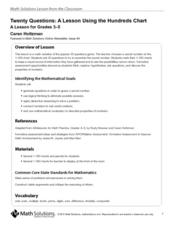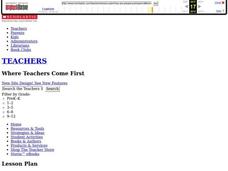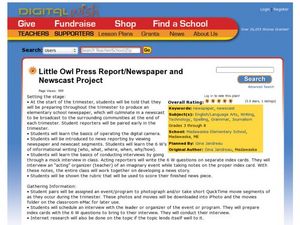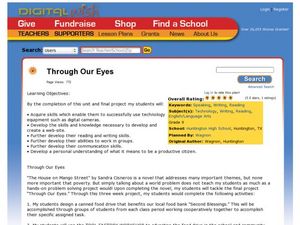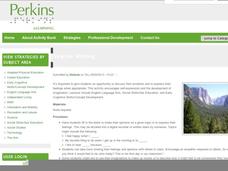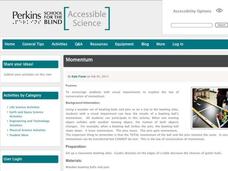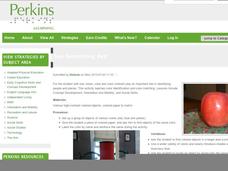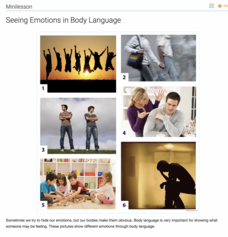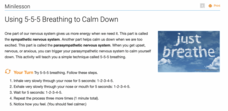Curated OER
Twenty Questions: The Hundred Chart
Use the 20 Questions game to practice math vocabulary and number properties! Project a hundreds chart and hand one out to learners. Ideally, give them counters (beans would work well) to mark off the chart so you can play multiple times....
Curated OER
Plant Biology
Young biologists discuss the reasons behind the current use of the plant identification system. They get into groups and identify the characteristics of each species of plant which is described. The keys needed for groups to make...
Curated OER
How are People Portrayed by Different Media?
Your 9th - 12th graders can hone their analysis and critical thinking skills by studying the way a subject is portrayed across media types. They examine how various print, visual, and online sources have portrayed key players in the 9/11...
Curated OER
Stewart's Boxes
Learners collect memorabilia and create shadow boxes in the style of David Stewart. They also compose a poem and explain their identity in an oral presentation. This is a rare lesson that works quite well for a variety of age levels.
Curated OER
Click it! See it! Say it!
Scholars take digital photographs of a phonic cluster. Each child will use their digital pictures in a PowerPoint slide with text showing the sound and the word that contains that sound. Then they will take a picture of the object they...
Curated OER
The Flat WSD Students
Young scholars engage in creative writing and performance using Flat Stanley. After reading Flat Stanley your class summarize their understanding and then create a flat image of themselves. Students then brainstorm ideas of how they...
Curated OER
Little Owl Press Report/Newspaper and Newscast Project
Discover journalistic techniques by having learners prepare and write their own class newspaper. They discuss the five W's of investigative journalism and conduct interviews with school figures. They utilize video technology, podcast...
Curated OER
Through Our Eyes
After reading Sandra Cisneros’ novel The House on Mango Street, class members design a canned food drive, create advertisements for the drive, and use digital cameras to document the entire process. In addition, pupils journal their...
Perkins School for the Blind
Encouraging Students Who are Blind or Visually Impaired to Express Their Feelings and Explore Imagination
Being expressive in a creative, empathetic, or imaginative way is not only fun, it builds good pre-writing and communication skills. Learners with visual impairments have a roundtable discussion session where several sentence frames are...
Perkins School for the Blind
Circle Time
Oftentimes children or teens with one or more disability are reluctant to participate in whole-group activities. Foster good participation, verbal expression, and social skills through daily circle time activities. Each day you and your...
Perkins School for the Blind
Momentum
The laws of momentum can lead to fun! Learners with visual impairments use bowling pins and a bowling ball to model the law of conservation of momentum. They take turns bowling with differing degrees of force to explore how energy is...
Perkins School for the Blind
I See Something Red
For learners with low vision, the ability to identify colors is an important skill that will help them identify people and places. Groups of brightly colored objects are placed around the room. The child is then given a colored paper and...
Perkins School for the Blind
Following Directions
Turn the act of following directions into a fun and engaging game! Especially designed for students with cognitive or intellectual disabilities, this lesson plan uses a game format as a natural reinforcer. Write a set of directions onto...
Math Solutions
Factor Game
Learning about factors and multiples is all fun and games with this simple math activity. The lesson begins with the teacher and class playing the Factor Game together as students figure out the rules and uncover key vocabulary as they...
IMAX
Hubble
Explore what it takes to service the Hubble telescope. In the set of three activities, groups investigate several aspects of the Hubble telescope, including robotic arms used during repairs, spacesuits, and extravehicular activity (EVA)...
Teach Engineering
Air Pollution in the Pacific Northwest
Scholars investigate levels of nitrogen dioxide in the Pacific Northwest by examining the role of nitrogen in air pollution and how remote sensing can be used to measure nitrogen levels. An Excel spreadsheet calculates the difference...
Teach Engineering
Considering Trade-Offs and Maximizing Efficiency in a Fast Food Restaurant
Make fast food restaurants even faster. Groups consider trade-offs when maximizing efficiency in fast food restaurants. Restructuring schedules and floor plans, as well reassigning job duties, all fall under this directive.
Thoughtful Learning
Doing Random Acts of Kindness
Encourage scholars to perform random acts of kindness. A lesson challenges participants to choose a peer they wish to be kind to without them knowing. Learners list five good deeds and choose one to fulfill. Pupils reflect on the process...
Thoughtful Learning
Using Positive Self-Talk
Boost positive self-talk with a chart that turns negative feelings into happy ones. Scholars write down their negative emotions then rewrite them with a positive flair to aid in changing their outlook.
Thoughtful Learning
Seeing Emotions in Body Language
Scholars test their skills of reading body language with a collaborative learning experience that focuses on showing and identifying emotions. Pairs take turns acting out an emotion, one uses body language while the other guesses what...
Thoughtful Learning
Using 5-5-5 Breathing to Calm Down
Scholars calm their minds and bodies with a 5-5-5 breathing exercise. Learners breathe in for five seconds, out for five seconds, then wait five seconds to start again. The exercise takes one minute to complete.
Thoughtful Learning
Setting and Reaching Goals
An activity boosts self-management through goal setting and reflection. Scholars choose one goal they wish to obtain by the end of the week. Participants brainstorm ways to make their goal a reality then reflect on whether or not their...
Curated OER
F. Scott Fitzgerald: Winter Dreams
Students study the biography and work of F. Scott Fitzgerald. They learn how the author used autobiographical elements in writing his stories and they try a hand at writing a Fitzgerald-style story with autobiographical elements of their...
Curated OER
A Number a Day
Summary: This activity is designed to help young scholars understand: The concept of number and its relationship to the calendar What a calendar is and how it can be used to keep track of time One-to-one correspondence and sequencing...


